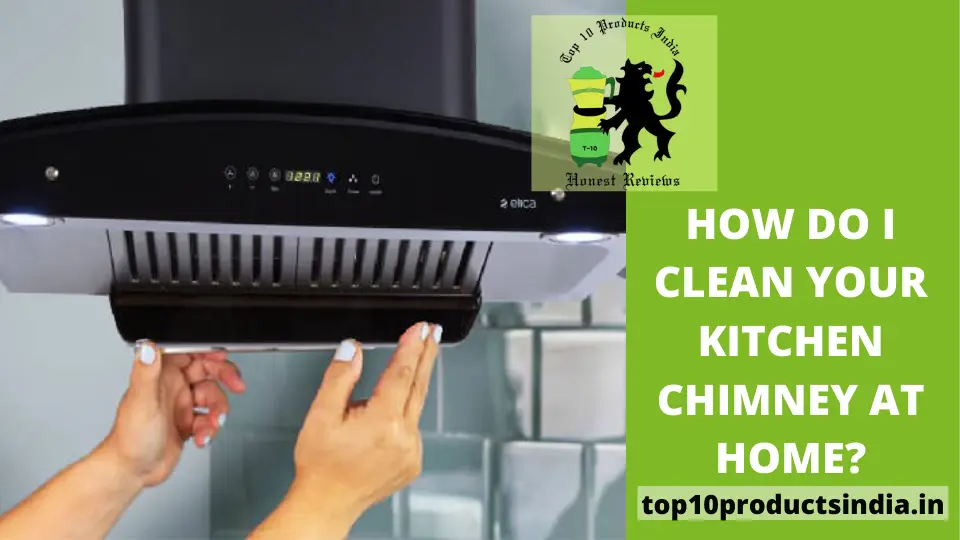Cleaning your kitchen chimney can be an extremely difficult and time-consuming job. A majority of Indian cooking requires a lot of oils and spices, which produce a lot of smoke. The grease and oil that comes that smoke produces can become trapped in the filters, reducing the effectiveness of the chimney.
If your filters aren’t clean, the oil or grease droplets from the filters could fall onto the open flame of your stove and ignite. It can also be absorbed into the food you are cooking and cause contamination.
Your chimney needs to be maintained regularly. It isn’t necessary to shell out money to engage an expert cleaning service. You can find many items at your local grocery store to clear your chimneys, such as vinegar, caustic soda, dishwashing liquid, salt, and many more. Find out the method.
What is the reason a kitchen chiller is Essential These days?
1). Purified air
The strong odour that emanates from cooking spice and curry may be harmful to those suffering from respiratory ailments. Modern chimneys clean and clean the air. It does this by sucking out unwelcome particles that can cause coughing problems. The filters in the chimney capture dust particles and provide the air with a fresh, clean, and fresh scent.
2). Keep your tiles safe
Floors and tiles typically attract dust and dirt caused by smoke produced during cooking. The dust will settle and create dark spots in your tiles that aren’t attractive to look at. It can be difficult to get rid of those spots. A chimney collects all tiny particles to keep your floor and tiles tidy.
3). Guards the Wall
Your kitchen walls can begin appearing dark and dusty once you cook or fry something that needs more oil.
The paint can be damaged due to the fumes and smoke emanating from your stoves. Kitchen chimneys play an important part in this. They draw out the dirt, grease, and smoke, making your walls look sparkling and tidy.
4). A sophisticated style
If you’re interested in modular kitchens and chimneys, then a chimney is ideal to consider adding to your wish list. Modern chimneys have an attractive look that will add an elegant look to your home.
How Often Should You Clean Your Chimney?
With all the uses chimneys in kitchens can serve, it is important to ensure that the chimneys are regularly cleaned to improve performance and last longer.
The chimney needs to be cleaned every 2 to 3 months. However, it is also contingent on the amount of work. The amount of grease you produce when you cook simple meals is less than when you prepare meals for guests, requiring more oil and more spices.
The ideal time for cleaning your chimney is around 2-3 months.
However, certain signs suggest that your chimney needs to be cleaned as soon as possible. This includes odours that are foul or performance issues, black patches, and oily stains on the meshes of your chimney.
If chimneys are not given maintenance, they can slow the motor’s power. It will ultimately block holes in filters. Creosote is a substance that can build up in chimneys and could cause serious fire-related accidents.
This can lead to serious problems and could cause your pockets to cover repair costs. A dirty chimney can also impact the health of your respiratory system. Therefore, think twice before you put off your routine of cleaning.
Procedure To Clean Kitchen Chimney
Cleaning your chimney can be difficult, especially if you aren’t sure of the proper procedure. This is a comprehensive step-by-step guide to cleaning your chimney.
1). filter
Whenever we talk about the efficiency of a kitchen chimney, filtration always proves to be a big consideration. The efficiency of any kitchen chimney is determined by the power of its capturing all dust particles. We’d recommend you clean your chimney’s filter every 7-10 days for higher efficiency.
Are you wondering how to clean a kitchen chimney duct?
Well, it’s too easy! You just need baking powder, baking soda, and strong vinegar. Just visit your local grocery stores to buy all that.
- You’ll need to make an emulsion using vinegar and baking soda. Make an extremely fine paste by mixing a few vinegar drops and soda.
- Check that your filters are dried before your next use.
- It is also possible to use dishwashing liquid or lemon gel to wash the filters.
- The vinegar will assist in removing tough staining. The baking powder acts as an element that can neutralize acidic grease.
- Allow it to soak for five minutes. Clean it off with a wet or dry cloth.
- Spread the paste across the filter. Be sure that the paste can reach all edges of the grid.
2). External components
Cleaning the outside components of your chimney is much easier than cleaning the filters. The chimney can be cleaned each week to create a shiny appearance from the outside.
For cleaning the outer surfaces, paint cleaner, dishwasher liquid, or paint thinner, prove to be sufficient. Follow this process to get an uncluttered and fully-clean surface within a couple of minutes.
- Make with a few drops of dishwashing liquid or paint thinner by water.
- After that, gently scrub the exterior of the chimney.
- Remove any excess water from the cloth
- Allow it to remain for a couple of minutes, letting the micelles draw the oil spots away from the chimney’s surface.
- For 1 minute, Soak a cotton cloth in your solution.
- Clean the cloth and soak it in water and clean the surface. The surface wiping can also be done using a dry cloth and rapidly complete the drying process.
- Make sure the surface is dry before use.
3). Internal components
Security measures and precautions should clean the interior parts. The chimney is home to the motor responsible for the chimney’s operation. It is important to ensure that you do not use water to clean the internal components. This can cause short circuits.
You need to clean the inner parts with the help of a professional. A cloth and toothbrush play a great role in cleaning the surface stained by stains and dust.
Materials Needed
It’s possible to use the materials you have at hand to help make the cleaning process of your chimney easy. Cleaning with a damp, wet cloth isn’t as effective as these basic ingredients.
Take a look at a few of the readily available items at the local shops.
1). Paint Thinner
It is a solvent that is used to wash grease and oil stains. Nail polish removal agents such as Acetone could be utilized for paint thinners.
Utilizing a paint thinner may take longer than other options. However, the results are acceptable.
Put a piece of cotton into the solution and rub it over the areas in the filters which have staining. After rubbing, clean the area thoroughly using water.
Dry it out before the next use.
2). Baking soda
Sodium bicarbonate is another name for baking soda. We often use it as a baking ingredient. Toothpaste and mouthwashes also contain this ingredient. They are the basic ingredients that neutralize acidic particles such as grease and dust after bonding with them. This is a superb ingredient when it comes to cleaning surfaces.
To prepare a huge soda mix, you can mix water or vinegar (which is in paste form) with the baking soda. Let the baking soda sit for a short time to see amazing results.
Be aware that baking soda shouldn’t be used in large quantities. It can cause skin irritation when exposed. You should wear gloves to protect yourself.
3). Lemon
Like Vinegar, Lemon is a powerful acid used as a powerful cleaning agent. It can remove the toughest staining that is caused by smoke and oil. Like vinegar, lemons leave behind a refreshing and soothing smell that is impossible to resist.
Include a few drops of Lemon in hot water to soak a fresh, dry cotton cloth for three minutes. Then squeeze the cloth to get away any excess water. After that, you can gently wipe the outside surfaces and filters. The stains will begin disappearing within a few minutes. Make sure to clean it thoroughly using an abrasive cloth. Using lemon, it’s very easy for you to wash your chimney once a month.
4). Dishwashing Liquid
Never overlook the power of dishwashing liquid. Use liquids that contain lemon extracts. Dishwashing liquids produce faster results than other ingredients. It is soft and simple to use.
Mix the liquid by adding water, then pour it into the filter. The filters are gently scrubbed with a gentle scrub and get immediate results. It is also a great way to wash the exterior surfaces on the chimney. Allow it to remain for a short time. Clean them off with a moist cloth to eliminate the foam. The cleaning process involves micelles’ formation. Micelles are formed when moving by water and bond to the oil stain. They bind to the greases, leaving behind a smooth, clear surface.
5). Hot Water
If you’re the kind of person who cleans their chimney often, hot water can do the job.
Other ingredients such as baking soda, lemons vinegar, and paint thinners are only used when the chimney has not been cleaned for too long. Hot water can be a great way to clean out the exterior components and the filters. Be sure to avoid using water to wash internal components.
Clean a cotton cloth into warm or hot water, then squeeze out any excess water. After that, wipe the chimney’s surface and allow it to dry. The entire process will take between 5 and 10 minutes. A little time every at least once in a while is essential for ensuring the longevity of your equipment.
6). vinegar
Vinegar is an acidic substance that can get rid of hard-to-clean staining. It eliminates bacteria and removes hard-water deposits. Cleaning your chimney is a fantastic alternative to costly cleaning gels available in marketplaces.
Vinegar is a great addition in stained areas to get quick results. Vinegar can also be mixed with baking soda to scrub your chimney regularly. Vinegar is utilized to clean surfaces on the exterior and the filters. However, the use of vinegar can cause an unpleasant odor that requires a long time to go away.
7). Caustic Soda
Caustic soda can be a multi-faceted alkali often employed to build industrial chimneys. However, it can be employed in home chimneys too. The high pH alkali removes the toughest stain that vinegar and baking soda fail to remove.
It is best to keep it away from children. Add some caustic soda onto the filters, then pour boiling water over the filters. It should remain untouched for a couple of days. Avoid touching caustic soda with your fingers. They’re very concentrated and could cause serious burns.
It is not recommended to use this substance too often for cleaning the chimney. It can wear away the surface if employed in excess.
Safety precautions when taking care of the chimney in your kitchen.
The most important consideration for cleaning every kitchen appliance is safety and security. We have provided a list of precautions that all homeowners must follow.
- Dry all components completely the following cleaning to avoid the risk of damaging circuits or causing shocks.
- Do not use caustic soda on naked hands. It could cause serious skin irritations such as irritation and burning.
- Check that the chimney is off before cleaning. When water comes into contact with electricity can cause major injuries.
- Protect your stove or induction before taking care of the chimney. The first debris could get caught and clog the hole within the cooker.
- Clean your chimney regularly. If it is not cleaned for longer, it will result in obstruction and the build-up of toxic substances.
Frequently Answered Questions
Which one is better? Auto or manual cleaning chimney?
Utilizing an auto-cleaning chimney can reduce the strain of regularly cleaning them significantly. However, these chimneys cost more. Most people prefer using a manual chimney for cleaning thoroughly. The auto-cleaning chimneys can fail to get rid of more difficult oil stains.
Is cold water able to be utilized to wash chimneys?
There is nothing wrong with drinking cold water. But the results will not be the same as when you use hot water. Use cold water to cut out the components after cleaning. It is suggested to make use of hot water for immediate results.
How simple is it to clean auto-clean chimneys?
Auto-clean chimneys have just one button, which removes all dust once it is pressed. The filters are cleaned automatically every so often. You can take the components off to be cleaned thoroughly every six months.
What if I take professional help for cleaning my chimney? What can be the expense?
Well, cleaning a chimney isn't that daunting a task, but still, a few people with busy lives prefer getting it done by professionals. As a rough estimation, a home visit of a chimney cleaning professional may easily cost you 500-700. Keep in mind, that you need to clean your chimney after a few days, and if you take professional help every time, it may hurt your wallet.
Conclusion
Every kitchen appliance needs proper maintenance and care. All we require is a little patience and a bit of consistency. Be sure to clean your chimney regularly according to the amount of work it is expected to do.
Use the method and the ingredients that you like. Be sure to follow the safety guidelines, which must be observed before cleaning. If you buy an auto or manual chimney, you’ll need to clean them at least once over time. If something serious, such as a fire or electric shock, is experienced, seek medical or expert assistance immediately.
It is recommended to change your filters each year to breathe fresh and clean air.





